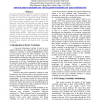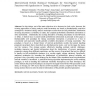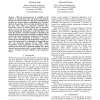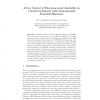14 search results - page 1 / 3 » Implications of Device Timing Variability on Full Chip Timin... |
93
Voted
HPCA
2007
IEEE
16 years 2 months ago
2007
IEEE
As process technologies continue to scale, the magnitude of within-die device parameter variations is expected to increase and may lead to significant timing variability. This pap...
126
Voted
SAC
2006
ACM
15 years 8 months ago
2006
ACM
: In chip design, one of the main objectives is to decrease its clock cycle; however, the existing approaches to timing analysis under uncertainty are based on fundamentally restri...
122
Voted
DELTA
2002
IEEE
15 years 7 months ago
2002
IEEE
Teaching the practical aspects of device and chip design in New Zealand presents many problems, including high manufacturing costs, long lead times, and the lack of local industry...
127
click to vote
ASPDAC
2008
ACM
15 years 4 months ago
2008
ACM
- With the increasing levels of variability in the behavior of manufactured nano-scale devices and dramatic changes in the power density on a chip, timely identification of hot spo...
129
click to vote
GECCO
2003
Springer
15 years 7 months ago
2003
Springer
Continuous Time Recurrent Neural Networks (CTRNNs) have previously been proposed as an enabling paradigm for evolving analog electrical circuits to serve as controllers for physica...




